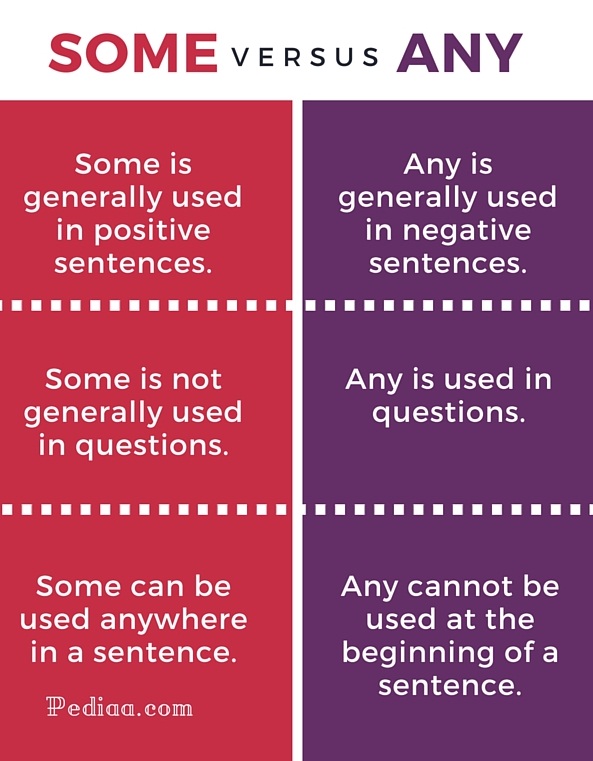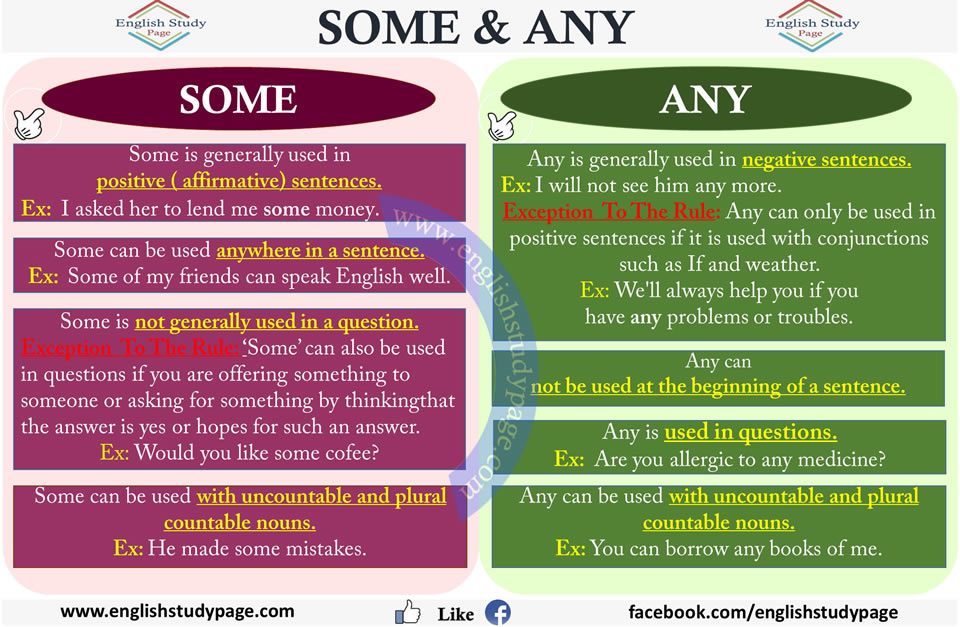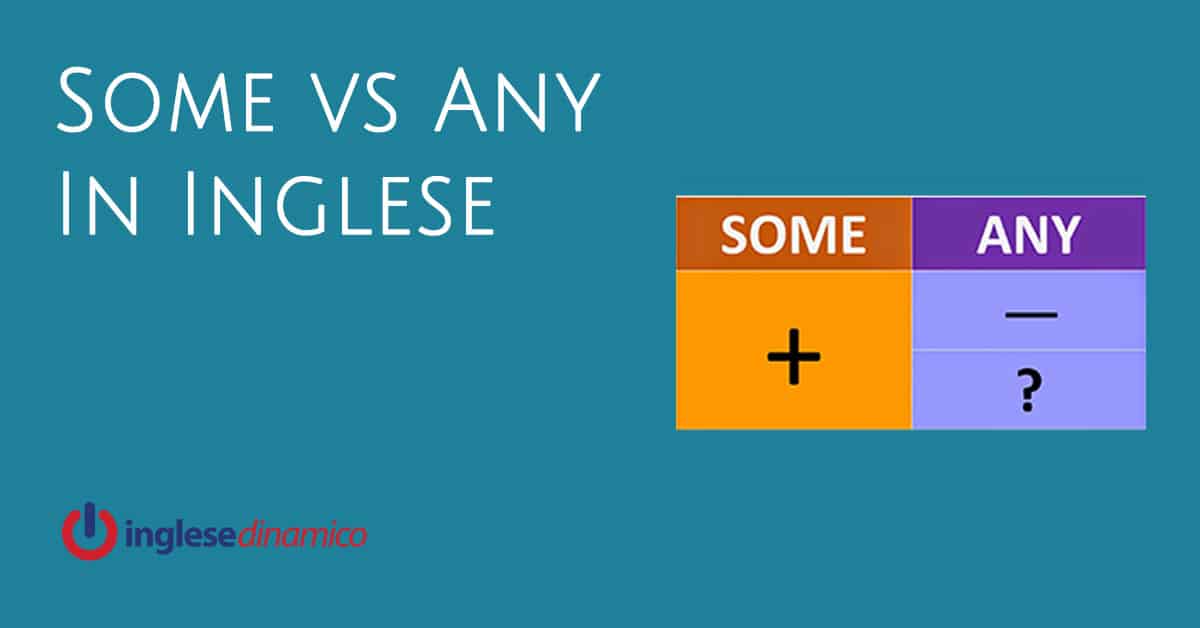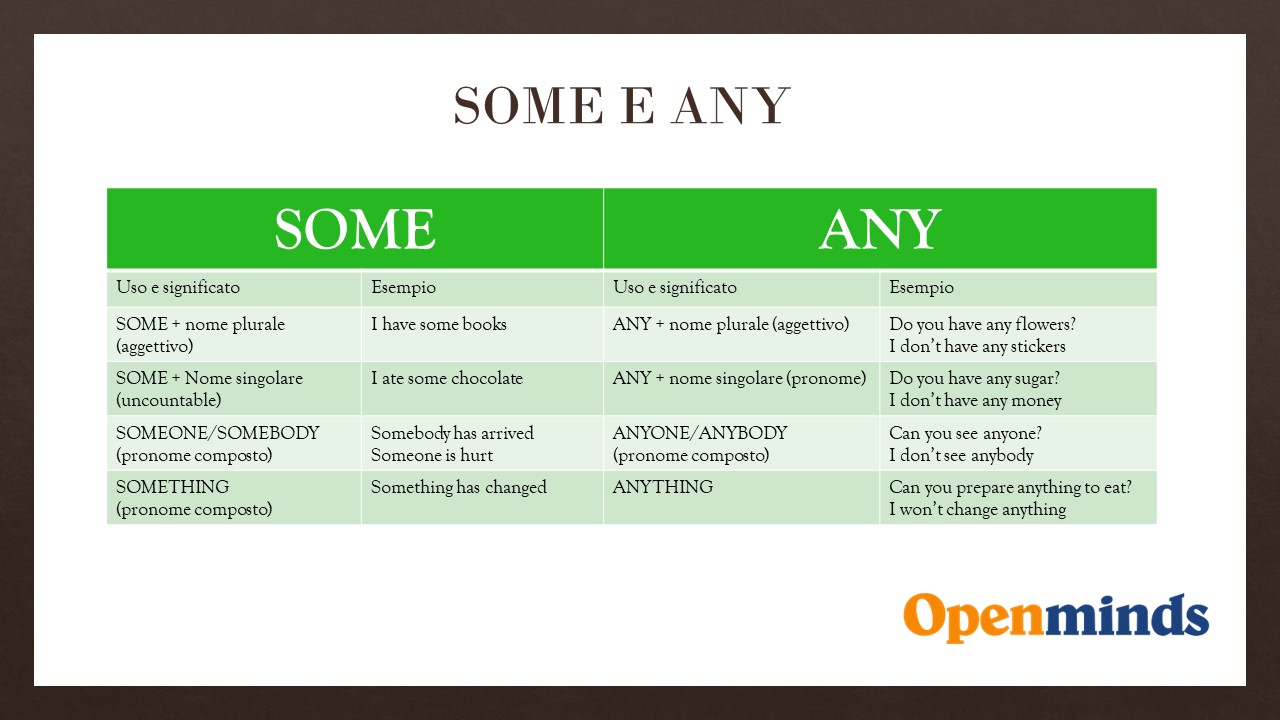
Diferencia entre SOME y ANY KSE Academy Academia de inglés
Updated on January 21, 2020. 'Any' and 'some' are used in positive and negative statements as well as in questions and can be used for both countable and uncountable (non countable) nouns. Although there are some exceptions, generally speaking, 'any' is used in questions and for negative statements while 'some' is used in positive statements.

Complete Os Espaços Com Some Ou Any EDUCA
Generally, it is better to use some, not any, for affirmative statements and answers. Correct: You may have some. Yes, I'd like some. Incorrect: You may have any. For negative statements and answers, it usually makes more sense to use any. Examples: I don't want any trouble. I can't have any pets in my apartment.

Difference Between Some and Any
When to Use Any. Any is also a word you can use with uncountable nouns. The difference between any and some is that you should only use any in negative statements. Negative sentences are sentences that state that something is false. You can turn a positive sentence into its negative form by adding a word like not, never, and without.

The difference between A, AN, SOME and ANY. English Grammar Rules
Learn the Difference Between 'Some' and 'Any' in Less Than a Minute. Ann Edwards. Updated on January 14, 2021 Grammar. Some typically implies a specific type or form. For example: I bought some candles. Some of my Facebook friends live in San Diego. Some is only used in a question when an offer is being made, or there is a request for.

Some Vs. Any Learn english, Learn english grammar, Learn english words
The difference between some and any: Generally, we use any in the same way as some: when we are thinking about a certain amount or number of something. Remember, usually both some and any can only be used with plural countable nouns or uncountable nouns, but not usually with singular countable nouns. She bought some tomatoes [positive sentence].

What’s the Difference Any and Some Materials For Learning English
Some and any. Some water, some bread, some wine. Un po' di acqua, un po' di pane, un po' di vino. (non numerabile, singolare) Some people, some children, some animals. Un po' di persone, alcuni bambini, qualche animale. (numerabile, plurale) Some of you will be sent to the doctor. Alcuni di voi saranno mandati dal medico.

Some and Any infographics English Time, English Fun, Learn English
Affirmative Sentences. Yes, you can use any in affirmative sentences. However, the meaning can change! Here are some explanations. a. IF + ANY - If you need any help, let me know (in this case, it means a "little" or "some". Any is very common in this kind of phrase. b. Talk to ANYone, ANYwhere, ANYtime in English!

Uso di "some" e "any" Tutto Mappe Scuola
Più in generale, possiamo dire che la prima differenza tra some e any in inglese è che some è utilizzato in tutte le frasi affermative, mentre any è usato in tutte le frasi negative. In entrambi i casi, potrai usare some e any sia con countable plural words (ovvero con la S e posso contare la quantità, come nel caso di apples & pears) sia.

Quelle est la différence entre some et any ?? Leaenglish
Se la risposta è NO, niente paura e nessun imbarazzo. La differenza tra some e any è sottile e un po' tricky come talvolta avviene nella grammatica e nella lingua inglese. Se vuoi sapere quando si usa some e any sei nel posto giusto: Novakid - che organizza corsi di inglese online per bambini dai 4 ai 12 anni in 49 paesi del mondo e sempre con insegnanti madrelingua - ha pensato a te.

some and any ESL worksheet by esta Teaching english grammar
Some and any - English Grammar Today - a reference to written and spoken English grammar and usage - Cambridge Dictionary

Using SOME and ANY in English English Study Page
Only use "some" and "any" with uncountable nouns and plural countable nouns: She wants some water. (water = uncountable noun) He hasn't received any e-mails yet. (e-mails = plural countable noun)

Some e Any Vediamo le differenze Inglese Dinamico
Rule. Use some when the context is positive and any when it is negative as well as in most cases of questions. For example: I have some money / I don't have any money. I put some jam in the sandwich / I didn't put any jam in the sandwich.
Qual a diferença entre Some e Any?
Some vs. Any. Both some and any are determiners we use with plural countable nouns and uncountable nouns. A determiner is a part of speech that modifies nouns and noun equivalents, clarifying what a noun to which it refers. For example: Incorrect: Some jacket is too tight for me. Correct: Some jeans are too tight for me.

The Differences Between SOME and ANY Learn english, English grammar
Potremmo tradurre some ed any con l'espressione italiana 'un po' di' e, pertanto, le utilizziamo per riferirci ad una quantità indefinita, perché non sappiamo, o non ci interessa sapere, la quantità esatta.. I need to buy some butter Ho bisogno di acquistare del burro; Sto dicendo che ho bisogno di comprare una certa quantità di burro, ma non sto specificando esattamente la quantità.

SOME vs ANY How to Use Some and Any in Sentences Love English
Some refers to a quantity of people or things whose number is not specified. Any is a quantifier which signifies quantity of a noun, but not in exact terms. It denotes whatever, whichever, whoever. Pronunciation. sʌm. ˈɛni. Used with. Plural nouns and nouns that do not indicate exact quantity or number.

Some e Any come usare questi pronomi o aggettivi indefiniti in inglese
Some or Any. "Some" and "any" are determiners. They describe an amount or type of something. They are often used before plural countable nouns when the exact amount is not known or is not important. "Some" and "any" are also used before uncountable nouns. They cannot be used for singular nouns because both "some" and "any" mean more than one or.